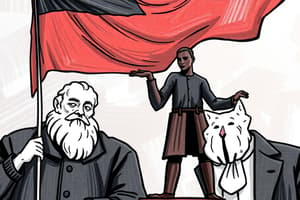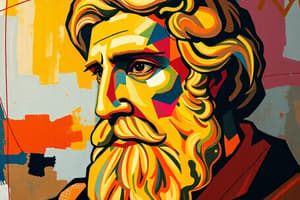Podcast
Questions and Answers
What concept did Aristotle introduce in his analysis of political systems?
What concept did Aristotle introduce in his analysis of political systems?
- Historical materialism
- The polis (correct)
- Natural law
- The philosopher-king model
Which philosopher is known for integrating Christian theology with political philosophy?
Which philosopher is known for integrating Christian theology with political philosophy?
- St. Augustine (correct)
- Plato
- John Locke
- Cicero
What did John Locke argue was fundamental to a just government?
What did John Locke argue was fundamental to a just government?
- Machiavellian statecraft
- Power without consent
- Divine right of kings
- Natural rights (correct)
Which political thinker is associated with the idea of absolute sovereignty?
Which political thinker is associated with the idea of absolute sovereignty?
What is one of Karl Marx's key critiques of capitalism?
What is one of Karl Marx's key critiques of capitalism?
Which movement focuses on the impact of gender on political structures?
Which movement focuses on the impact of gender on political structures?
What is the purpose of the social contract in political philosophy?
What is the purpose of the social contract in political philosophy?
What concept emphasizes individual freedom and minimal government intervention?
What concept emphasizes individual freedom and minimal government intervention?
Flashcards are hidden until you start studying
Study Notes
Overview of Western Political Thought
- Definition: Western political thought encompasses the ideas and philosophies that have influenced political systems, governance, and civic life in Western societies.
Ancient Greece
- Key Philosophers:
- Plato: Advocated for a philosopher-king model; emphasized the role of justice in society.
- Aristotle: Developed the concept of the polis; analyzed different political systems and introduced the idea of citizenship and virtue ethics.
Roman Contributions
- Cicero: Emphasized natural law and the importance of a mixed government; influenced later republican thought.
- St. Augustine: Integrated Christian theology with political philosophy; discussed the City of God vs. the Earthly City.
Medieval Political Thought
- St. Thomas Aquinas: Combined Aristotelian philosophy with Christian doctrine; emphasized the role of law and justice.
- Machiavelli: Shifted focus to pragmatic governance; introduced ideas about power, statecraft, and the nature of political morality in "The Prince."
Enlightenment Era
- John Locke: Advocated for natural rights (life, liberty, property); argued for the social contract and government by consent.
- Thomas Hobbes: Proposed the idea of the social contract; viewed the state of nature as chaotic and advocated for absolute sovereignty.
- Jean-Jacques Rousseau: Emphasized the concept of the general will and the social contract; criticized inequality and advocated for democracy.
19th Century Political Thought
- Karl Marx: Critiqued capitalism; introduced historical materialism and class struggle; envisioned a classless society.
- John Stuart Mill: Advocated for utilitarianism and individual liberty; emphasized the importance of free speech and women's rights.
20th Century Developments
- Libertarianism: Emphasizes individual freedom, minimal government intervention, and free markets.
- Feminist Political Theory: Explores the impact of gender on political structures; advocates for equal rights and representation.
- Postmodernism: Challenges traditional narratives and ideologies; focuses on the relativism of truth and the fragmented nature of identity.
Key Concepts in Western Political Thought
- Social Contract: Agreement among individuals to form a society and government, outlining rights and duties.
- Natural Rights: Fundamental rights inherent to individuals, often viewed as universal and inalienable.
- Democracy: System of government by the whole population, typically through elected representatives.
- Justice: Central theme in political philosophy, involving fairness and equality in societal dealings.
- Power and Authority: Examination of the sources and legitimacy of power within political systems.
Conclusion
Western political thought has evolved through various historical phases, each contributing to contemporary political systems and theories. Understanding these foundational ideas is crucial for analyzing modern political structures and debates.
Overview of Western Political Thought
- Encompasses influential ideas and philosophies shaping political systems and civic life in the Western world.
Ancient Greece
- Plato: Proposed the philosopher-king as ideal governance; focused on justice as a societal cornerstone.
- Aristotle: Introduced the concept of polis; classified political systems and emphasized citizenship and virtue ethics.
Roman Contributions
- Cicero: Highlighted natural law and mixed government; significantly influenced republican ideologies.
- St. Augustine: Merged Christian theology with political discourse; explored the dichotomy between the City of God and the Earthly City.
Medieval Political Thought
- St. Thomas Aquinas: Integrated Aristotelian thought with Christianity; underscored law's importance for justice.
- Machiavelli: Brought a pragmatic approach to governance; analyzed power and statecraft in "The Prince," emphasizing political morality.
Enlightenment Era
- John Locke: Advocated for natural rights (life, liberty, property), promoting the social contract and government consent.
- Thomas Hobbes: Viewed the natural state as chaotic; introduced the social contract theory advocating for absolute authority.
- Jean-Jacques Rousseau: Focused on the general will within the social contract; critiqued social inequality and championed democratic ideals.
19th Century Political Thought
- Karl Marx: Critiqued capitalism and introduced historical materialism; perceived class struggle as a path to a classless society.
- John Stuart Mill: Supported utilitarianism and individual freedoms; championed free speech and women's rights.
20th Century Developments
- Libertarianism: Prioritizes individual liberty, limited government, and free market principles.
- Feminist Political Theory: Investigates gender's influence on politics; advocates for equal representation and rights.
- Postmodernism: Challenges established narratives and ideologies; emphasizes the fluidity of truth and identity.
Key Concepts in Western Political Thought
- Social Contract: Foundation of organized society; delineates individuals' rights and responsibilities.
- Natural Rights: Viewed as universal, these rights are inherent and inalienable to every individual.
- Democracy: Governance system based on representative election, promoting broad participation.
- Justice: Central to political philosophy, addressing fairness and equality within society.
- Power and Authority: Investigates legitimacy and origins of power within political frameworks.
Conclusion
- Evolution of Western political thought through historical eras is pivotal for understanding modern governance and political theories.
Studying That Suits You
Use AI to generate personalized quizzes and flashcards to suit your learning preferences.




